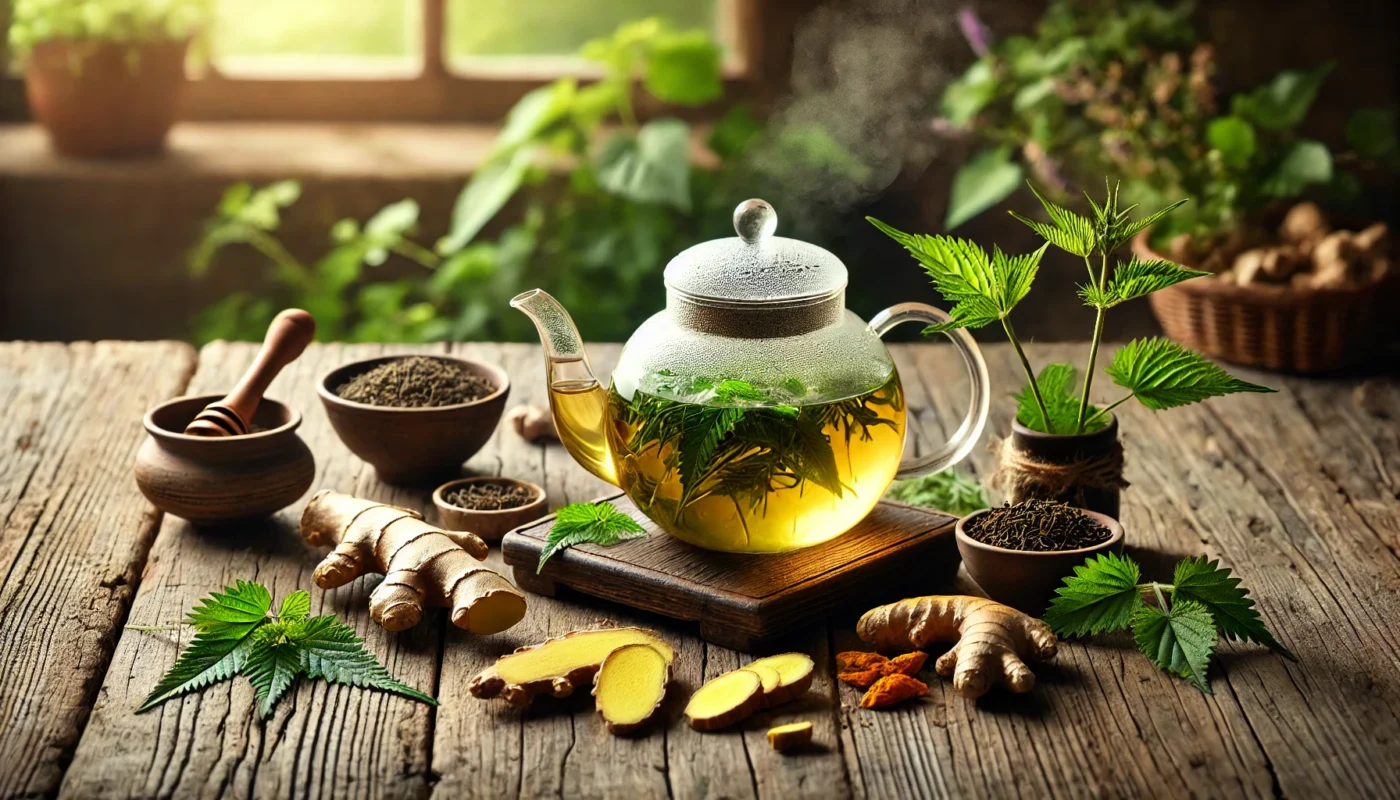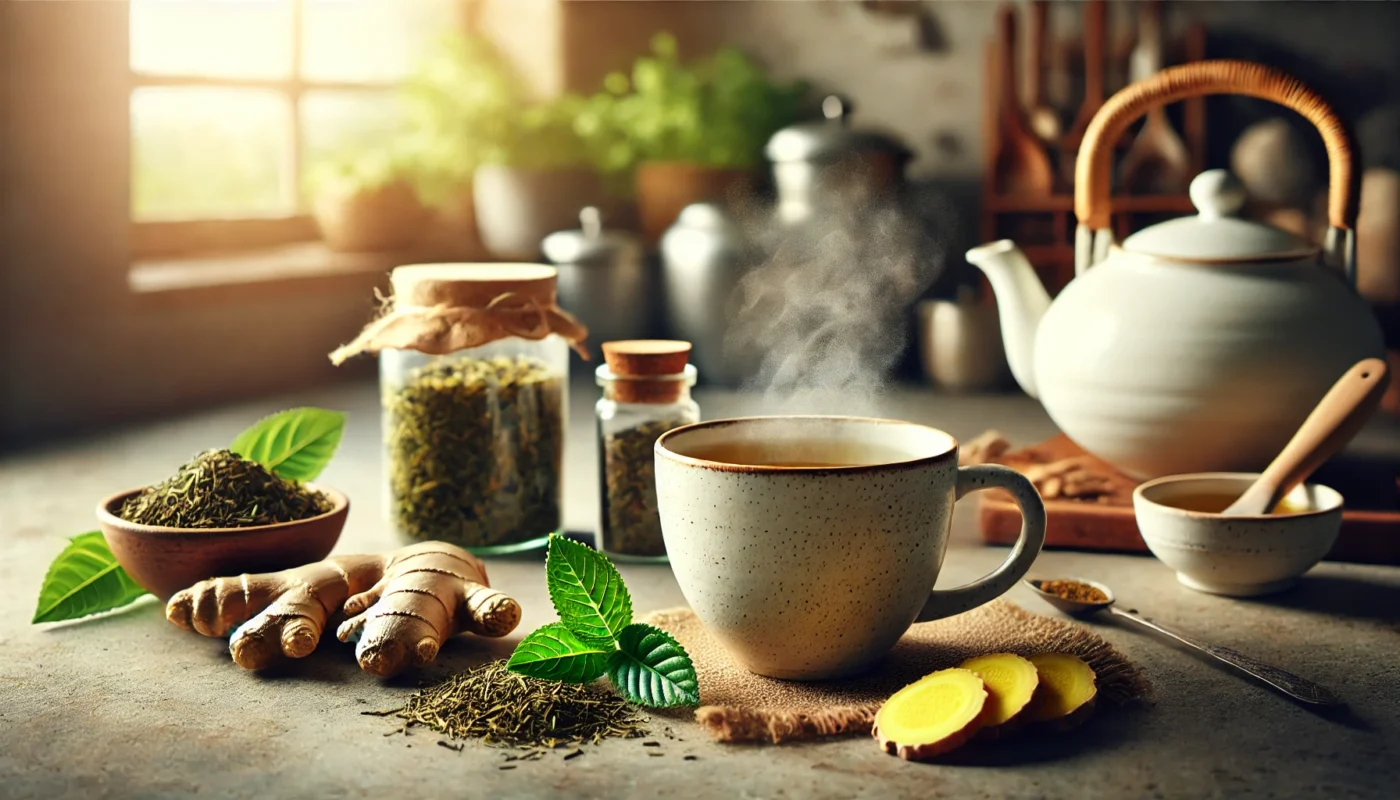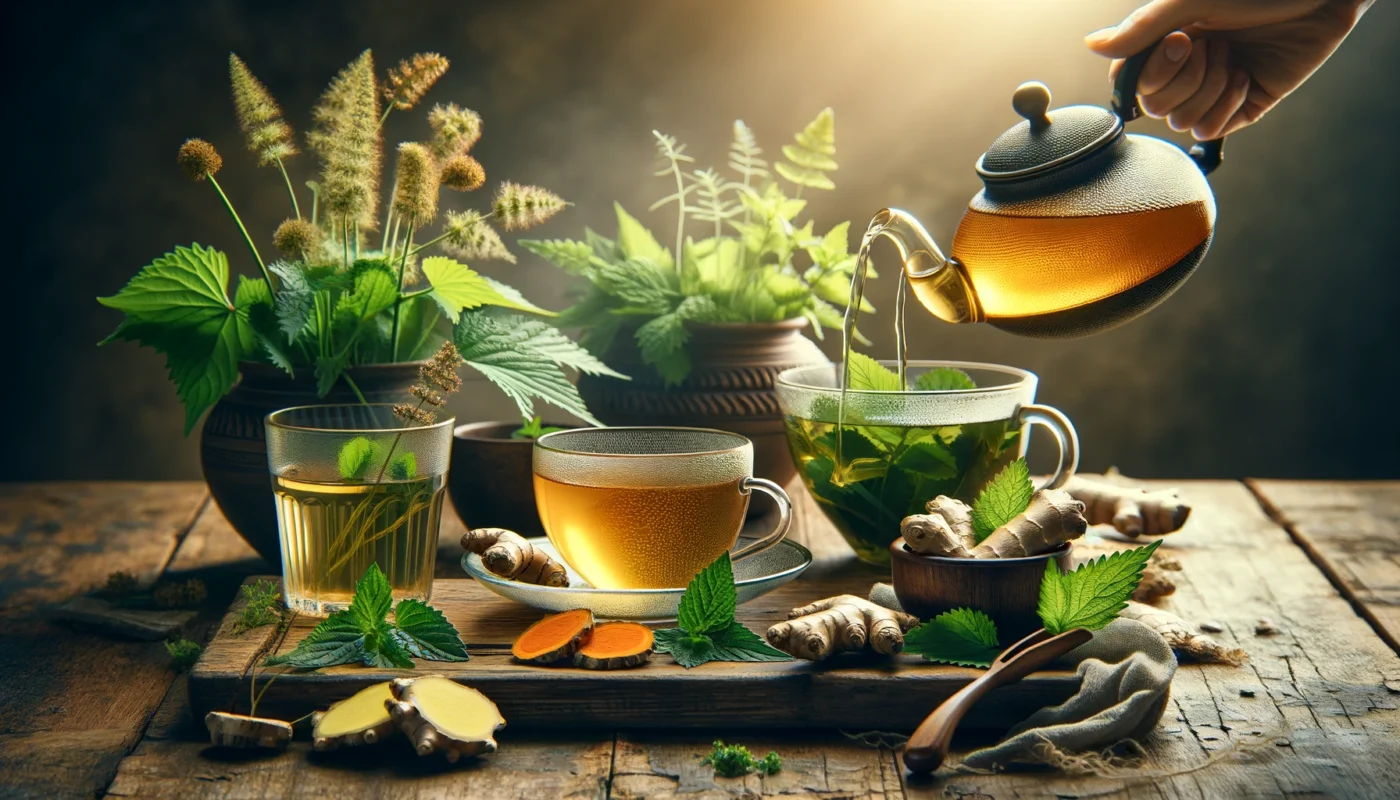Arthritis is a common ailment that affects millions worldwide. It’s characterized by joint pain and inflammation, often leading to reduced mobility and quality of life.
For many, managing arthritis pain is a daily challenge. Traditional medications can provide relief, but they often come with side effects. This has led many to seek natural remedies, such as herbal teas.
Herbal teas have been used for centuries to alleviate various health conditions. They’re rich in antioxidants and anti-inflammatory compounds, making them a potential complementary treatment for arthritis pain.
In this article, we’ll delve into the science behind herbal teas and their potential benefits for arthritis. We’ll explore various types of herbal teas, from green tea to ginger, turmeric, and nettle tea, among others.
We’ll also provide practical advice on how to incorporate these teas into your arthritis management plan. This includes potential side effects, interactions with medications, and the role of diet and lifestyle in managing arthritis.
Whether you’re a fitness enthusiast, a health enthusiast, or a medical patient, this comprehensive guide aims to help you navigate the world of herbal teas for arthritis pain.
Join us as we explore the potential of these natural remedies in providing relief and improving your wellbeing.
You May Also Like: Natural NSAIDs: Benefits and Side Effects
Understanding Arthritis and Its Impact
Arthritis is a broad term that encompasses over 100 types of joint diseases and conditions. The most prevalent forms are osteoarthritis and rheumatoid arthritis. Each type varies in its specific symptoms and progression.
Osteoarthritis is considered a degenerative joint disease. It results from wear and tear on the joints, leading to pain and stiffness. It’s commonly seen in older adults.
Rheumatoid arthritis, on the other hand, is an autoimmune condition. The immune system mistakenly attacks the joints, causing inflammation and swelling. This can lead to severe joint damage if untreated.
People with arthritis often experience a range of symptoms that affect their daily lives, including:
- Persistent joint pain or aching
- Stiffness, especially in the morning
- Swelling in and around the joints
- Reduced range of motion in affected areas
- Fatigue and general discomfort
The impact of arthritis extends beyond physical symptoms. Many individuals deal with emotional and psychological challenges due to chronic pain and mobility issues. This can lead to stress and a decrease in overall wellbeing.
Understanding arthritis is essential for effective management. This often includes a combination of medical treatments and lifestyle adjustments. Natural remedies, such as herbal teas, can be a valuable component of this approach.
Herbal teas offer a holistic option that may support joint health and reduce inflammation. Exploring these options can empower people with arthritis to take an active role in their health care journey.

The Science Behind Herbal Teas for Arthritis Pain
Herbal teas have been used for centuries to support health, and modern science is catching up. Research shows potential benefits for arthritis pain relief. The key lies in the active compounds present in various herbs.
For instance, green tea is rich in polyphenols, powerful antioxidants known to reduce inflammation. These compounds can help combat oxidative stress, which contributes to joint degeneration in arthritis patients. Studies support the anti-inflammatory effects of these polyphenols.
Ginger tea contains gingerols, which are believed to have potent anti-inflammatory properties. These compounds may decrease pain and swelling in arthritic joints. Research indicates that ginger could be as effective as some non-steroidal anti-inflammatory drugs (NSAIDs).
Turmeric tea’s active ingredient, curcumin, has garnered attention for its anti-inflammatory and analgesic properties. Curcumin can inhibit certain inflammatory pathways, offering relief from arthritis symptoms. Despite its promise, it’s important to note its bioavailability is usually low.
Nettle tea has anti-inflammatory capabilities. Scientific studies suggest that compounds in nettle leaves can block inflammatory pathways, offering potential benefits for those with arthritis. This could be a natural alternative to some medications.
Willow bark tea, often referred to as nature’s aspirin, contains salicin. Salicin is a precursor to aspirin and provides pain-relief benefits. Studies have shown its effectiveness in reducing arthritis pain, though it’s important to use it under guidance due to potential side effects.
Ultimately, while these herbal teas show promise, more research is needed. They may complement conventional treatments and offer relief for some. Before incorporating herbal teas into a regimen, consulting with a healthcare provider is crucial, especially for those on prescribed medications.
Top Herbal Teas for Arthritis Pain Relief
Herbal teas can be a soothing way to manage arthritis pain. Different teas offer unique benefits thanks to their bioactive compounds. These compounds often have anti-inflammatory and antioxidative properties. Below, we explore some of the top herbal teas renowned for alleviating arthritis symptoms.
- Green Tea: Its polyphenols are potent against inflammation and oxidative stress.
- Ginger Tea: Known for its gingerols, which may lessen joint swelling.
- Turmeric Tea: Contains curcumin, a strong anti-inflammatory agent.
- Nettle Tea: Provides anti-inflammatory benefits naturally.
- Willow Bark Tea: Acts like natural aspirin for pain relief.
- Rosehip Tea: Rich in vitamin C and antioxidants, aiding joint health.
- Boswellia Tea: Contains boswellic acids with anti-inflammatory effects.
- Licorice Root Tea: Can reduce inflammation and protect joints.
By understanding each tea’s specific benefits, you can make informed choices. Consider what fits best within your lifestyle and health needs. Consulting a healthcare provider is always a wise step. This ensures you avoid any undesirable interactions with current medications.
Green Tea: A Potent Anti-Inflammatory
Green tea stands out for its high polyphenol content. These compounds, especially epigallocatechin gallate (EGCG), are well-researched. They help combat inflammation, a key factor in arthritis.
Regular consumption of green tea may improve joint function. Its antioxidants fight free radicals that cause cellular damage. Studies suggest a correlation between green tea intake and reduced arthritis symptoms. Adding this tea to your daily routine can be a simple, effective strategy.
Ginger Tea: Soothing Warmth for Joints
Ginger tea is cherished for its warming effects and health benefits. The primary bioactive component, gingerol, is a strong anti-inflammatory agent. It may help reduce discomfort in aching joints.
Apart from its soothing warmth, ginger tea can enhance circulation. Better circulation aids in reducing inflammation. Scientific studies have shown its potential to relieve symptoms as effectively as certain NSAIDs. Including ginger tea in your diet could mean fewer joint pain flare-ups.
Turmeric Tea: Curcumin’s Healing Power
Turmeric tea offers the therapeutic benefits of curcumin. Curcumin is a potent anti-inflammatory and antioxidant compound. It may halt the progression of inflammatory arthritis.
Although curcumin’s bioavailability is a challenge, consuming it with black pepper or fat enhances absorption. Regular intake can relieve pain and improve joint mobility. This makes turmeric tea an enticing option for long-term management of arthritis symptoms.
Nettle Tea: A Natural Remedy for Swelling
Nettle tea has been utilized for its healing properties across cultures. The herb contains components that inhibit inflammatory processes. This can be beneficial for swollen joints common in arthritis.
Researchers have found nettle tea can reduce NF-kB, a protein complex involved in inflammation. Drinking nettle tea may ease arthritis symptoms without harsh side effects. It represents a natural, complementary approach to managing joint pain.
How to Incorporate Herbal Teas into Your Arthritis Management Plan
Incorporating herbal teas into your daily routine can be a simple yet effective way to manage arthritis. The first step is identifying which teas suit your specific health needs. Consider your symptoms and preferences when making your selections.
Start by consulting with a healthcare provider or a professional herbalist. They can offer tailored advice based on your medical history and current medications. This step helps ensure that your chosen teas are safe and effective for you.
Once you’ve selected your teas, integrate them into daily rituals. You might enjoy a soothing cup in the morning or afternoon. Herbal teas can be a great alternative to caffeinated drinks or sugary beverages. Enjoy them hot or iced, based on your preference.
To make the most of herbal teas in your management plan, consider the following tips:
- Combine different teas to address multiple symptoms.
- Drink consistently to experience cumulative benefits.
- Explore creative recipes, like iced tea blends or herbal infusions.
- Pair your tea ritual with other relaxation techniques.
- Keep track of any improvements or reactions.
Remember, patience and consistency are key. It might take some time to notice improvements in your symptoms. Stick with your routine, and adjust as needed in consultation with a healthcare provider. Herbal teas offer a natural, holistic approach to supporting joint health over time.

Potential Side Effects and Interactions with Medications
Herbal teas, while natural, can have side effects. Some herbs may cause digestive issues or allergic reactions in sensitive individuals. It is important to start with small amounts to see how your body reacts.
Interactions with medications are another consideration. Some herbal teas might affect how your body processes certain medications. For example, they can enhance or reduce the efficacy of prescribed drugs.
Always consult a healthcare provider before adding herbal teas to your arthritis management plan if you take medications. This consultation can help identify potential interactions and ensure that your chosen teas are safe to use. Staying informed about these aspects ensures that you can enjoy the benefits of herbal teas without compromising your health.
The Role of Diet and Lifestyle in Managing Arthritis
Diet plays a crucial role in managing arthritis. An anti-inflammatory diet can help reduce joint pain and swelling. Incorporating foods rich in omega-3 fatty acids, like fish, can be particularly beneficial.
Equally important is maintaining an active lifestyle. Regular exercise not only strengthens muscles around joints but also improves flexibility. Physical activity can thus alleviate some symptoms associated with arthritis.
Stress management is another vital aspect. Techniques like yoga and meditation can reduce stress and, subsequently, inflammation. Reducing stress in everyday life can have a significant impact on arthritis symptoms.
Incorporating herbal teas into a holistic lifestyle approach complements these strategies. Here are some lifestyle tips for managing arthritis:
- Follow a balanced, anti-inflammatory diet.
- Maintain a regular exercise routine.
- Practice stress-reducing activities like yoga.
- Ensure adequate sleep and hydration.
These strategies collectively offer a multi-faceted approach to managing arthritis. With consistency, these lifestyle adjustments can lead to improved joint health and quality of life. Embracing both dietary and lifestyle changes can make a significant difference in arthritis management.
Herbal Supplements vs. Herbal Teas: What’s the Difference?
Herbal supplements and herbal teas both offer natural benefits, but they serve different purposes. Supplements usually provide concentrated extracts in forms like pills or capsules. These are designed for quick absorption and targeted effects.
Herbal teas, on the other hand, are more about the holistic experience. They bring both hydration and relaxation alongside their herbal benefits. Sipping a warm tea can ease stress and provide a soothing ritual, which aids overall well-being.
Moreover, the preparation process differentiates them. Herbal teas involve steeping leaves, roots, or flowers, releasing their properties slowly. This can make teas gentler on the system while still offering anti-inflammatory benefits.
Preparing Herbal Teas for Maximum Benefit
Proper preparation of herbal tea is key to maximizing its effectiveness for arthritis. The right techniques can enhance the therapeutic compounds.
Start by using fresh, high-quality herbs for rich flavor and potency. Ensure water is at the correct temperature. Typically, this means just under boiling to preserve delicate herbal qualities.
Preparation Tips:
- Use Fresh Herbs: Select fresh or properly dried herbs for the best outcomes.
- Correct Water Temperature: Avoid boiling water, which can damage certain compounds.
- Steep Time: Let the tea steep for the optimal time, usually 5-10 minutes.
- Proper Storage: Store herbs in a cool, dark place to maintain their potency.
These steps help ensure you receive the full range of benefits herbal teas offer, enhancing their soothing effects for arthritis symptoms.
Personal Stories: How Herbal Teas Have Helped Others with Arthritis
Herbal teas have a long history as natural remedies. For many people with arthritis, these brews have become essential companions in their journey to manage pain. Jane, for instance, began drinking ginger tea daily after experiencing significant joint discomfort. She found that the warming effect of ginger soothed her aches and improved her mobility.
Another inspiring story comes from Michael, a retiree who developed arthritis in his hands. He started drinking green tea after learning about its anti-inflammatory properties. Over time, he noticed less swelling and increased flexibility, allowing him to resume hobbies he had set aside. Michael attributes these changes partially to his consistent tea routine.
Sarah’s journey involved experimenting with different teas to find what worked best for her rheumatoid arthritis. After trying several options, she discovered that turmeric tea provided the most relief. The curcumin in turmeric seemed to ease her morning stiffness and allow her to start her day with more comfort. Her experience highlights the importance of personalizing herbal remedies.
These personal stories emphasize that while herbal teas may not be a cure, they can significantly enhance quality of life. By integrating these natural solutions, individuals living with arthritis may find new ways to ease their symptoms.

Conclusion: Embracing a Holistic Approach to Arthritis Pain Management
Arthritis pain can be a complex challenge, requiring a thoughtful and comprehensive approach. Herbal teas, with their blend of natural compounds, offer a gentle yet effective way to support arthritis management. They complement other treatments by reducing inflammation and providing comfort.
Integrating herbal teas into a balanced lifestyle can enhance overall well-being. By combining these natural remedies with mindful dietary choices, regular exercise, and stress-reduction techniques, you can create a holistic strategy for managing arthritis. Remember, it is essential to consult with healthcare professionals to tailor these strategies to your unique needs.
Further Reading:
Medical News Today: The 9 best herbs for joint pain
Everyday Health: 14 Herbs and Spices for Rheumatoid Arthritis Symptom Relief
National Library of Medicine: Use of Herbal Medications for Treatment of Osteoarthritis and Rheumatoid Arthritis
herbal teas, arthritis management, anti-inflammatory diet, natural remedies, stress management, holistic health, herbal supplements, omega-3 fatty acids, exercise for arthritis, personal stories, ginger tea, turmeric tea, green tea, wellness tips, lifestyle changes
Important Note: The information contained in this article is for general informational purposes only, and should not be construed as health or medical advice, nor is it intended to diagnose, prevent, treat, or cure any disease or health condition. Before embarking on any diet, fitness regimen, or program of nutritional supplementation, it is advisable to consult your healthcare professional in order to determine its safety and probable efficacy in terms of your individual state of health.
Regarding Nutritional Supplements Or Other Non-Prescription Health Products: If any nutritional supplements or other non-prescription health products are mentioned in the foregoing article, any claims or statements made about them have not been evaluated by the U.S. Food and Drug Administration, and such nutritional supplements or other health products are not intended to diagnose, treat, cure, or prevent any disease.

